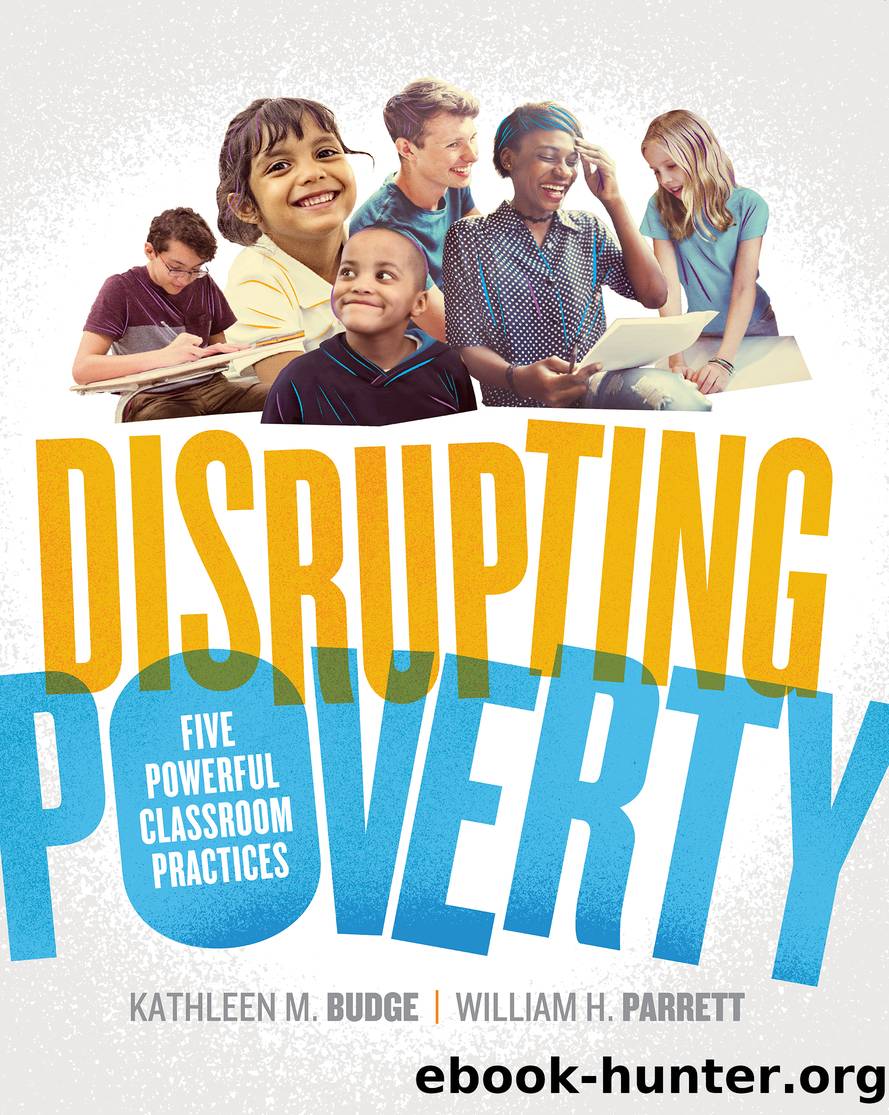Disrupting Poverty by Budge Kathleen;Parrett William H.; & William Parrett

Author:Budge, Kathleen;Parrett, William H.; & William Parrett [Budge, Kathleen & Parrett, William]
Language: eng
Format: epub
Publisher: Association for Supervision & Curriculum Development
Published: 2018-01-02T00:00:00+00:00
4. Act from an Empathic Perspective
Empathy is a disposition one can choose to adopt. Studies have demonstrated that an empathic disposition not only leads to better relationships with students (see Chapter 3), but also promotes a supportive classroom climate for student-centered pedagogy (McAllister & Irvine, 2002). Empathic behavior is characterized as "sensitivity, patience, respect, tolerance, acceptance, understanding, flexibility, openness, and humility" (p. 439).
An empathic disposition is important not only when establishing high expectations for academic learning, but also for other forms of learning such as social skills, productive habits of mind, and positive behavior. Most of the teachers we interviewed told us empathy was a key to their success with students. Miranda's point of view was indicative of others. She shared her perspective:
When you know your students and your students know you, you don't need to have all the rules and you won't need to raise your voice. I talk to them as I'm talking to you, and they'll listen to what I'm saying because they know that I respect them for who they are as people. I don't talk to them like they're little kids. I talk to them as people. I may not use big words, but I talk to them on a level that lets them know I respect them and I expect the same in return, and they do.
Stanford University researchers Okonofua, Paunesku, and Walton (2016) found that when teachers adopted an empathic mindset for discipline, student suspension rates were cut in half, respect for teachers was sustained, and students were motivated to behave well in class. Teachers in the study who received a modest amount of professional development focused on developing an empathic mindset regarding discipline, which was defined as "valu[ing] students' perspective and maintaining high-quality relationships during disciplinary interactions" (p. 5221). Understanding and valuing students' perspectives "does not ask teachers to share students' perspective or to think that perspective is reasonable" (p. 5223). An empathic mindset is based on the premise that when teachers are successful in conveying their respect and care for students, the students' "feelings about, and behavior in, school can and do improve" (p. 5223). In an interview in Education Week (Sparks, 2016), one of the researchers, Jason Okonofua, asserted, "Changing the mindset of one teacher can change the social experience of that child's entire world."
Download
This site does not store any files on its server. We only index and link to content provided by other sites. Please contact the content providers to delete copyright contents if any and email us, we'll remove relevant links or contents immediately.
The Art of Coaching Workbook by Elena Aguilar(51149)
Trainspotting by Irvine Welsh(21631)
Twilight of the Idols With the Antichrist and Ecce Homo by Friedrich Nietzsche(18615)
Fangirl by Rainbow Rowell(9224)
Periodization Training for Sports by Tudor Bompa(8247)
Change Your Questions, Change Your Life by Marilee Adams(7732)
This Is How You Lose Her by Junot Diaz(6868)
Asking the Right Questions: A Guide to Critical Thinking by M. Neil Browne & Stuart M. Keeley(5751)
Grit by Angela Duckworth(5592)
Red Sparrow by Jason Matthews(5462)
Paper Towns by Green John(5173)
Room 212 by Kate Stewart(5102)
Ken Follett - World without end by Ken Follett(4716)
Housekeeping by Marilynne Robinson(4433)
The Sports Rules Book by Human Kinetics(4377)
Double Down (Diary of a Wimpy Kid Book 11) by Jeff Kinney(4257)
Papillon (English) by Henri Charrière(4251)
The Motorcycle Diaries by Ernesto Che Guevara(4081)
Exercise Technique Manual for Resistance Training by National Strength & Conditioning Association(4054)
